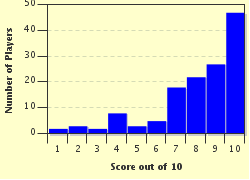Quiz Answer Key and Fun Facts
1. Who asked the question in Genesis 4:9, "Am I my brother's keeper?"
2. According to Genesis 22:8, what father said to his son, "God will provide for Himself the lamb for a burnt offering."?
3. In Genesis 21:6, a woman is quoted as making the following statement upon giving birth to a son after being barren for years: "God has made me laugh, and all who hear will laugh with me." Who was she?
4. Who is quoted as making the following statement to the LORD? "... I am not eloquent, neither before nor since You have spoken to Your servant; but I am slow of speech and slow of tongue."
5. Who made the following statement? "Naked I came from my mother's womb, and naked shall I return there. The LORD gave, and the LORD has taken away; blessed be the name of the LORD."
6. A young woman is quoted as making the following statement: "And so I will go to the king, which is against the law; and if I perish, I perish!" Who made the statement?
7. Who is credited with making the following statement? "But as for me and my house, we will serve the LORD."
8. The book of 2 Samuel tells of a prophet of God telling a parable to the king. The parable states: "There were two men in one city, one rich and the other poor. The rich man had exceedingly many flocks and herds. But the poor man had nothing, except one little ewe lamb which he had bought and nourished; and it grew up together with him and with his children. It ate of his own food and drank from his own cup and lay in his bosom; and it was like a daughter to him. And a traveler came to the rich man, who refused to take from his own flock and from his own herd to prepare one for the wayfaring man who had come to him; but he took the poor man's lamb and prepared it for the man who had come to him." Who told the parable to the king?
9. 1 Samuel 17:45 tells of a young man making the following statement to his adversary: "You come to me with a sword, with a spear, and with a javelin. But I come to you in the name of the Lord of hosts, the God of the armies of Israel, whom you have defied." Who made the statement?
10. What king is quoted as making the following request of the LORD? "And Your servant is in the midst of Your people whom You have chosen, a great people, too numerous to be numbered or counted. Therefore give to Your servant an understanding heart to judge Your people, that I may discern between good and evil. For who is able to judge this great people of Yours?"
Source: Author
Cowrofl
This quiz was reviewed by FunTrivia editor
CellarDoor before going online.
Any errors found in FunTrivia content are routinely corrected through our feedback system.

